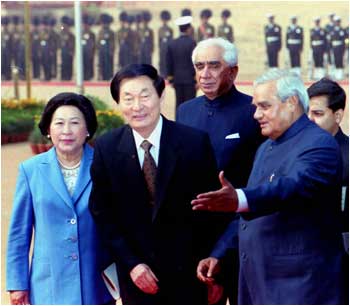'He knew that a regime which believes that power flows from the barrel of the gun can only be handled from a position of comprehensive strength and not from a position of vulnerability and weakness,' says Rup Narayan Das.

While Atal Bihari Vajpayee's contributions will always be remembered, his seminal contributions to India's proactive engagement with the world, particularly with China and Pakistan in India's neighbourhood is noteworthy.
Mr Vajpayee was a statesman of great insight and foresight who navigated the terrain of these complex relations.
He built the institutions of dialogue very thoughtfully and mindfully and yet dealt with India's northern neighbour on an equal footing.
While dealing with China, he never compromised the national interest or dignity of the country.
He knew well that China is India's neighbour and engagement with China is a strategic necessity, rather than a foreign policy option.
He also knew that a regime which believes that power flows from the barrel of the gun can only be handled from a position of comprehensive strength and not from a position of vulnerability and weakness.
By comprehensive strength, he meant both military strength, confidence building measures, forging strategic partnership at the global level, economic strength, diplomatic strength and also soft power.
His approach to China had a long view and it did not suffer from the obfuscation of knee-jerk reactions.
Vajpayee's outreach to China began soon after the erstwhile Janata Party government was formed in 1977 when he became India's external affairs minister in Morarji Desai's Cabinet.
He visited China from February 12 to 18, 1979 and held wide ranging discussions with then premier Hua Guofeng, then vice premier Deng Xiaoping, who later became undisputed leader, and then Chinese foreign minister Huang Hua.
In an atmosphere marked by frankness and cordiality, the two sides discussed the international situation, the situation in and around the Indian subcontinent and, most importantly, the issues affecting India-China relations.
While explaining the steps taken by India to create a climate of confidence between nations south of the Himalayas on the basis of scrupulous non-interference in the internal affairs of other countries, Foreign Minister Vajpayee made it clear that while India does not object to normal bilateral relations between Pakistan and China, the prospects of improvement of India-China relations would be impeded if their relations adversely affect India's legitimate interests.
He pointed out that the attitude on the Kashmir question taken by the Chinese government, which contrasted with the stand it had taken in the 1950s, was an additional and unnecessary complication in Sino-Indian relations. In this context he reiterated India's concern at the construction of the Karakoram Highway.
In his 1979 discussions with the Chinese leaders, Vajpayee emphasised that the satisfactory solution of the India-China boundary question was vital to the restoration of confidence and full normalisation in the climate of Sino-Indian relations.
The discussions in Peking succeeded in unfreezing the issue and led to the understanding that there should be further reflection on the possible ways of resolving this crucial question. It was agreed that tranquility should be maintained along the border.
On the question of Chinese assistance to disaffected elements from Nagaland, Mizoram and Manipur, the Chinese leaders stated that the support which may have been given earlier was looked upon as a matter of the past. Foreign Minister Vajpayee also expressed the hope that the Chinese government would consider facilitating pilgrimages to Kailash and Mansarover.
The two sides also reviewed the bilateral functional exchanges which had taken place since the return of their respective ambassadors in 1976 and explored the possibility of further exchanges in various fields of mutual benefit.
Vajpayee was in Hangchow after completion of his talks in Peking when he received news about the Chinese attack on Vietnam on February 17. He cut short his visit and returned to India immediately.
Vajpayee resumed his outreach to China when he became prime minister. He visited China in June 2003. His visit to China was a milestone in the relationship between the two countries.
Defence cooperation and military engagement between the two countries further received a boost during Mr Vajpayee's visit.
The joint declaration between the two countries signed on June 23, 2003, inter alia, mentioned that 'they agreed on the need to broaden and deepen defence exchanges between the two countries, which will help enhance and deepen mutual understanding and trust between the two armed forces.'
They confirmed that the exchange of visits by their defence ministers and of military officials at various levels should be strengthened.
Rup Narayan Das, PhD was a former senior fellow at the Institute for Defence Studies and Analyses.










